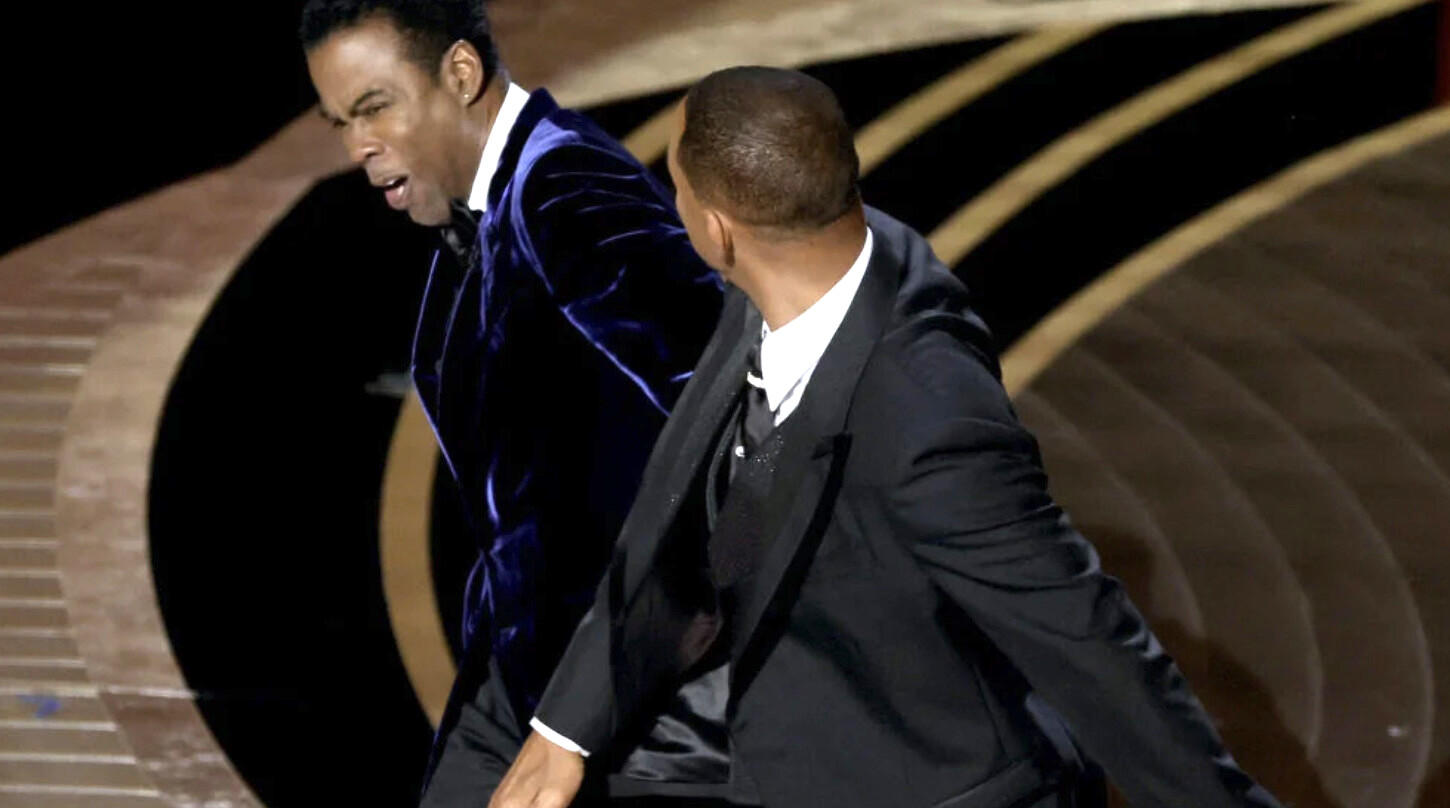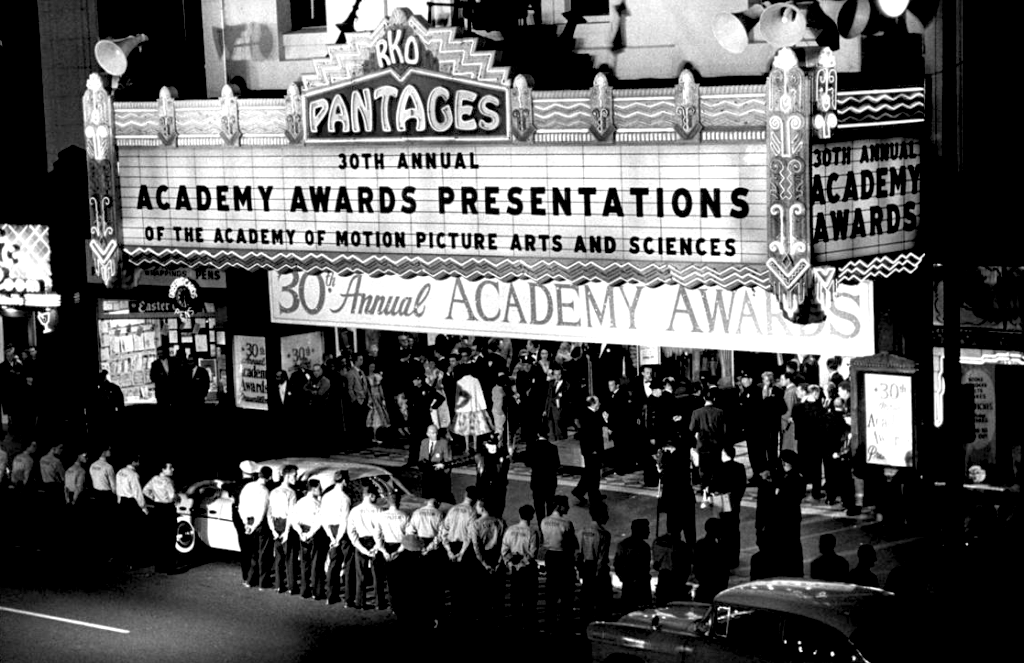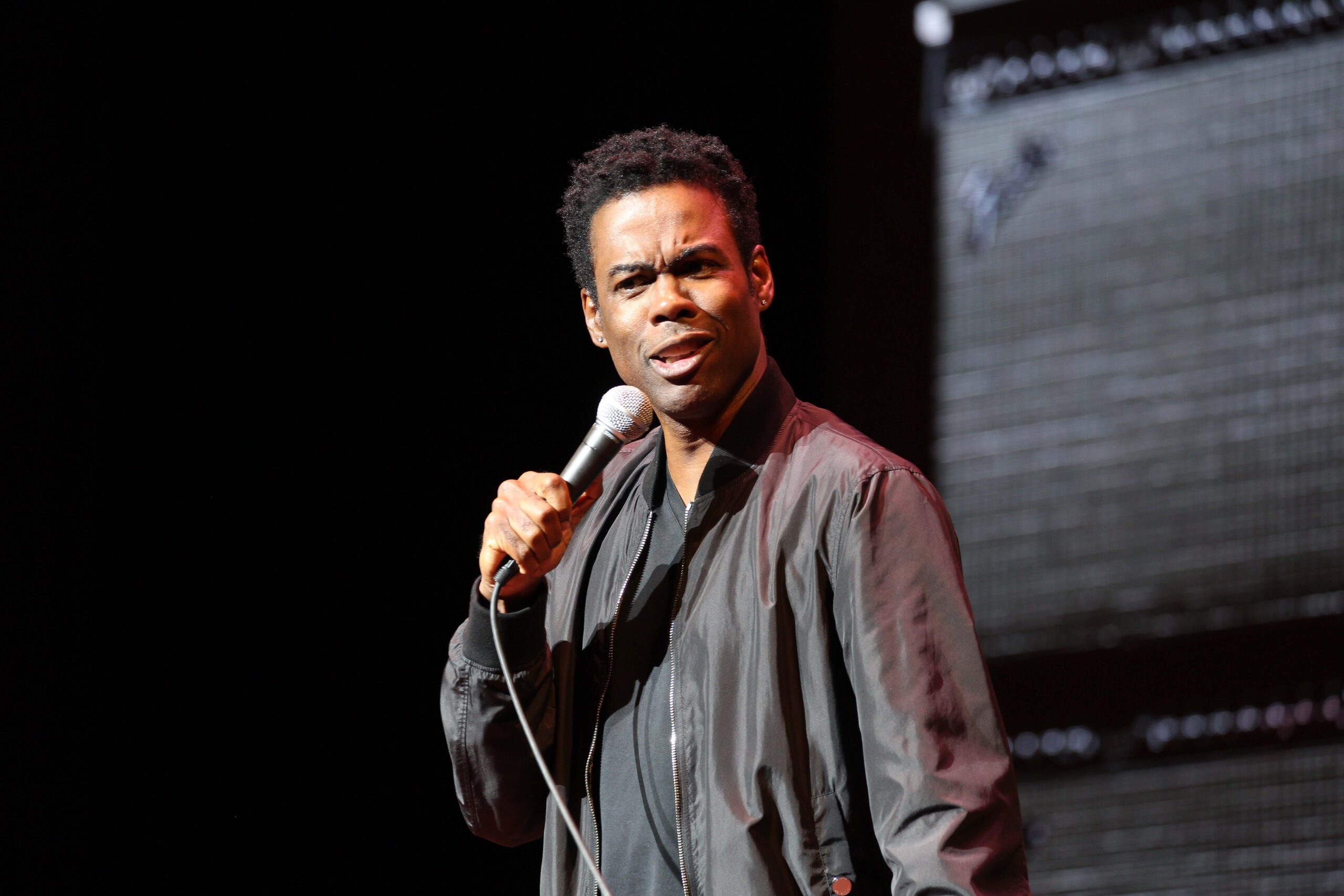Michael Brenner gives in to the impulse to say a few things about that celebrity incident of the century.

The Slap. (Budiey, Flickr, CC BY-NC 2.0)
 They say that to experience dangerous adventure is to become addicted to the thrill — the rush of adrenalin and the intoxicating exhilaration. Somebody suggested to me that publishing an essay that denounces the country’s self-described best and brightest — as well as the many who passionately share their beliefs —provides an approximation.
They say that to experience dangerous adventure is to become addicted to the thrill — the rush of adrenalin and the intoxicating exhilaration. Somebody suggested to me that publishing an essay that denounces the country’s self-described best and brightest — as well as the many who passionately share their beliefs —provides an approximation.
Well, in fact, it doesn’t. Too little is at risk, the expectations too low and the demonstration that personal ties are fragile no longer is revelatory after doing this for 12 years. Still, I can’t help wondering exactly what those powerfully emotional experiences, such as those felt in combat, are like.
So, I am giving in to the impulse to say a few things about that celebrity incident of the century that has aroused the American public as nothing else has since the Bill Clinton & Monica Lewinsky escapade.
I refer to: the “Slap Heard ‘Round the World” — soon to be a major motion picture which will make the event really real (especially if the main protagonists play themselves).
The Slap is one of those happenings whose after-life stirs us and intrigues us more than the act itself. It lacked the vivid drama that would have galvanized us all had former President Donald Trump put Nancy Pelosi — House minority leader at the time — in a lethal stranglehold at the climax of his last address to Congress; or if Sen. Cory Booker had body-slammed Republican colleague Ted Cruz on the floor of the Senate hearing room.
All we saw was a well-dressed gentleman get up from his seat, walk toward some loose-lipped vulgar comedian and strike him on the cheek with so little force that viewers couldn’t tell whether it was just pantomime. Athletes cuff each other more forcefully as friendly signs of congratulations.
The Storm Broke
But, then the storm broke. You’re all familiar with the gory details. However, you may have missed the psychologizing in reputable places by alleged professionals that offer complex explanations of Hollywood star Will Smith’s behavior by probing speculatively into his childhood, adolescence, associated trauma and suppressed violent emotions. Where is the Goldwater/Louis II/George III/ Nero/ Caligula rule when we need it?
A few facts might help us make sense of this:
- Chris Rock, the comedian, poked fun at the buzzcut hairstyle of Smith’s wife, Jada Pinkett Smith; comparing her to Demi Moore’s character in the 1997 action film of the same name, GI Jane. Rock said “Jada, I can’t wait for GI Jane 2,” prompting the actress to roll her eyes.
- Pinkett Smith has long suffered from alopecia and discussed the medical condition as the reason for shaving her head last year. Alopecia is an auto-immune disorder that causes hair loss.
- There is history to this. In 2016, Rock hosted the Oscars and joked about Pinkett Smith and her husband boycotting over #OscarsSoWhite, “Jada boycotting the Oscars is like me boycotting Rihanna’s panties,” Rock said during his opening monologue. “I wasn’t invited.” Hilarious – right off the bathroom wall of a Greyhound bus station.
Human Nature

(Asatira, Pixabay)
It is intrinsic to human nature to react the way that Will Smith did. Millions of years of evolution explain the emotion and the impulse to aggress the offending party. Survival, and — more important — the perpetuation of the individual’s genes — require that a mate be protected from danger; for procreation, for nurturing the young, for protecting the young.
That even holds for females who, in a number of mammalian species, will come to the aide of their male mates (e.g. lions and hyenas, wolf packs; check the You Tube clips). There is not a mammal on the planet that doesn’t share those instincts – including homo sapiens. Social history, observation and experience also tell us that this natural behavioral reaction has not been suppressed in organized communities, including modern ones.
Fights between males provoked by one of them either threatening to seize a mate, to hurt a mate, or even insult a mate normally triggers a hostile response. Often the female joins the fray, as happens in the wild among other species.
The behavioral changes imposed by the authority of organized society, and the rules that it seeks to instill in the populace, is twofold. First, it creates alternatives to an aggrieved party’s physically hostile response: call the cops, file a legal complaint, recourse to other non-violent actions (economic, social exclusion, destruction of property). Second, it strengthens inner inhibitions about expressing intense emotions (anger) through violence by stigmatizing it, i.e. inducing feelings of shame or guilt.
Our essential selves, though, have not changed since Neolithic or even Paleolithic times when societies were much smaller and simpler. Any conceivable genetic precursor to Chris Rock would have been weeded out very early on. Over most of the past 5,000 years, in every culture, such a person would not have gotten far into adult life without being punched, stabbed, or shot — on multiple occasions if he survived long enough.
A Previous Era

RKO Theater for the 30th Academy Awards. (Emmetkells, CC BY-SA 4.0, Wikimedia Commons)
There are many who have personal memories of a period in American life when an aggression reaction of the Smith sort could be expected in analogous circumstances; in some settings, almost certainly; in others possibly.
In none, would angry, hostile emotions be hidden. One might succeed in limiting the reaction to verbal violence; or, the woman might try to restrain the man — not because she didn’t want to see the “comedian” laid out on the floor, but because she was anxious that the man not get into trouble and/or cause them both to suffer in some way.
Personal experience: In the calm residential urban neighborhood in which I grew up, brawling was not at all common. And the local equivalents of Mr. Rock didn’t exist.
There was one revealing incident, however, related by a teenage friend. His father was driving his wife home from a doctor’s appointment that concerned a serious gynecological condition.
At a light, the driver of a car in the next lane shouted some vulgar obscenities at her (why?). Her husband, a burly man, got out and smacked the guy two or three times — leaving him bleeding over the steering wheel. What is notable is not the act itself but the reaction of others who heard about.
The dozen or so of us who heard the account were unanimous that our pal’s father had done the right thing, and that the guy he beat up deserved what he got. I recall that our well-educated parents had the same reaction. The only concern expressed was that he might get into trouble.
Admittedly, the incident did not occur at the annual meeting of the high school PTA. nor was it nationally televised. I have no doubt, however, if the provocation and reaction occurred in a public venue, there still would have been no fierce denunciations, no righteous scorning, no 10-year exclusion from future PTA meetings.
And if there were any psychologist/psychiatrists around, none would have written a long letter to the local newsletter explaining to us that Mr. X’s unseemly behavior was telling evidence that he had never overcome the trauma of the abuse he must have received as a child or the repressed fury dating back to his being kept out of the starting line-up in his middle school’s match against a rival school. Nor would they warn our parents to be on the lookout for tell-tale signs that we, too, might one day feel the uncontrollable fury to belt some insolent bastard.
In total candor, I have never spoken with a man whom I would suspect did NOT feel similar anger to what Will Snith did under analogous circumstances. I state this with circumspection since it is not a topic I can recall being discussed, or even mentioned on more than a very few occasions.
Contrary to beliefs held in some quarters, men do not spend their time together habitually exchanging views on how to beat up rivals or harass women.
Emotion Versus Action

Chris Rock performing in 2017. (Andy Witchger, CC BY 2.0, Wikimedia Commons)
It is imperative to separate the question of emotion from that of action. There are a host of elements that determine whether the former translate into the latter.
It is the former that is of greater interest since it is on that issue where the publicly stated consensus diverges from what we previously have understood as human nature and social interaction. Speaking personally as somebody who was a quasi-pacifist for most of my life, and who has had only two fights (both before the age of 10 and lasting 19 seconds in toto), I surely would have experienced the same emotions as Will Smith did and would have felt the impulse to do the clown-comedian some damage — however unlikely that I would have acted on it. I sure as hell wouldn’t have calmly smiled, chilled out and taken it as good fun in the spirit of the Oscar extravaganza.
In the eyes of many, that would have cast me as a throwback to a more primitive age. Someone who lacks the will to let a few million years of Nature stand in the way of a lighthearted lifestyle and a lucrative career. Someone who has not experienced the 21st Century Awakening as lifts the souls of the Hollywood crowd to their exalted Epicurean heights.
Finally, I’m struck by the relative silence of female activists. The few comments that I’ve run across join in the condemnation of Smith on the grounds that he acted as a macho who felt the need to “defend the weak little woman” = that outdated, pernicious, insulting notion. They don’t say how Jada should have reacted herself. Stay calm and shrug it off? or, walk up to Cox, kick him in the groin and then stuff the mike down his throat. Their reaction to that would have been fascinating to read.
Enough venting. I don’t want to be late for my scheduled visit to Gold’s gym where I work out on the heavy punching bag.
P.S. A few days after “processing” the incident (with or without a dictionary?), Rock made a public appearance. There, the entire audience stood to give him a thunderous round of applause. I would be indebted to anyone who can tell me what exactly it was that the crowd was applauding.
Michael Brenner is a professor of international affairs at the University of Pittsburgh. mbren@pitt.edu
The views expressed are solely those of the author and may or may not reflect those of Consortium News.

To begin , I too would like to know who is this “Mr. Cox” referred to, Wally Cox? I can’t imagine “Mr. Peepers” slapping anyone or getting slapped either. I’ve generally liked Will Smith”s movies (especially “Enemy of the State”) and tv roles and have considered him a quite likeable fellow, so I was fairly shocked by his reaction to what was admittedly a fairly tasteless joke. It did look to me though as if his initial reaction was amusement and only when he noticed his wife’s reaction did he feel the need to “man up” in a physical way. More shocking to me was the extreme vulgarity he shouted at Rock after retaking his seat, even reverting to ebonics grammar in the process. Anyway its ultimately another one of those Hollywood tales, full of sound and fury, signifying nothing. If I had had my beak slapped every time I mouthed off or cracked wise to somebody in my life, I wouldn’t have much of a face left. Just sayin’.
If I were editor of Consortium News, I wouldn’t have printed this article on this page containing the journalism of Max Blumenthal, Esha Krisnaswamy and Chris Hedges, et alia; not to censor it’s ideas but more in the spirit of keeping a daytime soap opera off a college course syllabus list of dramas including King Lear, The Cherry Orchard, Ghosts, The Lower Depths,
The Misanthrope, A Month in the Country, The Threepenny Opera, The Power of Darkness, An Enemy of the People, and The Inspector General. It is out of place. I don’t want to think about Will Smith and his personal problems when I am mourning Gonzalo Lira.
You could have skipped the article. I’m sure plenty of NYT readers don’t read Bret Stephens, but still like the paper. Plenty of people probably skip the sports too, or the business section, but buy it for what they are interested in. With all of the ad nauseam condemnation of the slapper, the slappee received hardly any criticism at all, so that insulting a woman with an illness was deemed acceptable. That needed to be addressed. This article is about larger issues in American culture than just this incident, issues that deserve to be debated.
I agree.
I often don’t watch the Oscars any more but happened to see “the slap,” and actually cheered. I’ve been waiting for someone to dock Chris Rock ever since I saw and heard him in New York. His routine was beyond anything I’ve ever heard or could imagine. He wasn’t just “dirty” or “blue” or “yellow.” No, he apparently thought it was funny to be as vulgar and vile as humanly possible, insulting both men and women equally. What was as shocking as his routine was that people actually laughed. Why would a crowd cheer him instead of Will Smith slapping him is beyond me.
I’m still not sure whether this was authentic or just staged, even after the supposed ban on attending the next ten Oscars for Will Smith. Who knows. But that slap was ultra lame and should never have happened, authentic or staged. Smith should’ve known better, as he used to be a comedian himself. And people who condone slapping someone over a joke deserve a slap or two themselves.
Having said that, it was a lame roast, and poorly delivered to boot. I don’t know why someone thinks roasting guests at the most elevated night in Hollywood is a good idea to begin with. It’s been going on for years now and it’s in poor taste. But, hey, the Yanks have never been known for having a good taste anyway.
Rock didn’t punch back, nor did he sue or whine. He acted like a man, as did Smith. Guys acting like guys. Perhaps the country is not doomed after all.
Yes there are biological reasons for (testosterone fueled) male behavior. But that’s not an excuse
in this situation. It’s more complex than it looks. Primarily because it’s well known that Will and Jada have (or have had in the past) an ‘open’ marriage. That brings in many more considerations,
which are really not worth even discussing. What is important to discuss however, is that the
Learned Professor has, by excusing Will’s behavior, taken agency away from Jada as to how to
respond to what was, in fact, a silly joke. (The joke in 2016 was as noted much more inflammatory).
Will instantly made it ‘all about him’ and in the process hijacked Jada’s agency as a grown woman
to respond in her own way and time.
Is this satire? Mammals coming to the aid of mates being insulted? I have yet to see my housecats go off on a neighbor cat for some insulting meowing. Is it well documented somewhere where dolphins physically attack one another over clicks, squeals, and whistles?
Another important action missed is that gold ole’ Will initially laughed at Chris’s ‘joke’ before noticing his wife’s reaction. He definitely didn’t appear immediately offended but maybe it took his brain a few moments to catch up to the action.
At what point do we consider a statement a personal insult? I’ve got a handicap (prosthetic limb) that draws occasional comments, some innocent, some purposefully directed. Am I absolved to resort to a physical response in these cases simply dependent upon my mood at the time? Is there a response that is over the limit? Slapping OK, maybe some good hard punches? How about if the assailant is much larger than me and my physical response is likely to result in a proportional retaliatory response? Can I resort to using a knife or gun to ‘protect’ myself from the verbal onslaught?
By this author’s reasoning, Columbine was a perfectly natural reaction to being ostracized from a specific group. These maligners would naturally have been weeded out early on in past societies and I guess in this case they were as well.
Politicians would have every right to go physical on their political opponents and the media for every perceived unjustified slight.
Comedians should expect physical violence for making fun at someone else’s expense. Heaven forbid they poke fun at a multi-millionaire who willingly puts themselves in front of everyone for financial gain. Chris Rock was applauded for maintaining his composure through the incident. He barley missed a beat in his monologue whereas a lesser professional may have stumbled his response and/or walked off stage interrupting the live ‘show’.
They were applauding Rock’s restraint.
Yep. Rock didn’t punch back, nor did he sue or whine. He acted like a man, as did Smith. Guys acting like guys. Perhaps the country is not doomed after all.
Well, I don’t agree with what Will Smith did on any level. Sure, you don’t have to like the joke, you can boo, hiss, show facial disgust, approach him after and demand an apology, but approaching him during the show and hitting him was completely out of line, in my opinion. He’s lucky Rock is not pursuing him civilly and/or criminally in Los Angeles County Superior Court.
Having read Blumenthal’s and Krishnaswamy’s report on the violence inflicted on dissidents in Ukraine this commentary by Brenner is all the more tone deaf. Undoubtedly millions of years of evolution also explain the torture and murder committed by the Zelensky regime. That Brenner’s article should appear mixed in with so much excellent reporting on the situation in Ukraine is unwittingly revealing about the state of the American consciousness and why we as a people are particularly ill-informed and susceptible to propaganda. Given all that this historic moment holds, some of the comments here approving of Smith’s violence are as sad as they are shocking. (I write this with a sense of appreciate for previous pieces written by Brenner and fully aware of my own human frailty, inconsistencies, and shortcomings.)
Who is this Mr Cox that is being referred to in the article?
The show was also sponsored by Pfizer,who just so happens to be putting out an alopecia drug soon supposedly
I just want to say thank you for what you wrote.
Being members of a preternaturally aggressive primate species, we can all instantly feel anger and even rage at perceived insults and injustices. What makes society possible, and a trait that people regardless of gender must possess in order to be worthy members of society, is a little thing called impulse control. As American consumer culture has devolved into one of narcissism and instant gratification, it is not surprising that we make excuses for public figures who do not demonstrate this capacity.
On the other hand, Mr. Rock did once star in a television series called “Everyone Hates Chris” after all.
Chris Rock was out of line. Will Smith did what he felt was needed to be done. Sometimes, some people, need to be dealt with in such a manner. And maybe now, Chris Rock will learn to leave the low hanging fruit jokes, and a certain man’s wife’s name, out of his mouth.
I love Will Smith and I’m glad he did that.
I’m with Russell Brand who described the Oscars thusly: “a festival of meaninglessness”; “a gargantuan glitter-covered turd of empty magnificence.” Understanding that we all indulge in distracting trivialities from time to time, that’s close to how I feel about this article. And from someone who’s commentaries are generally much more deserving of my attention. I think the Oscars, this incident, and the obsession with it tells us much about why we teeter on the abyss.
The writer leaves out the cultural context of roasting comedy that was at play here. Don Rickles several generations back was notorious for his biting insults and I don’t recall his targets hitting him.
This went way beyond even Don Rickles.
His targets were expecting insults as part of the honour. Rock intended no honour. He made a painful, public, cowardly attack on someone who couldn’t fight back. So I applaud Will Smith’s prompt bravery and restraint. After all he could have left Rock bleeding, with swollen lips and bruises, whimpering on the floor for his Mommy.
Rock may not have known about Jada’s condition and so what if he did. Video of Smith making fun of someone’s baldness: hxxps://www.youtube.com/watch?v=MD_hI58xJiI
Will Smith has never done anything I’d consider worthwhile. Is always all about himself.
As the saying goes there are many ways to skin a cat, but these is a feeble attempt to defend the some what indefensible. A lot has been said, but if every man acted unchecked on his primal impulses, we would not be here. More importantly It was a silly GI jane joke! Unfortunate for me I cant get back the time i spent to read and respond to this article.
With all that is going on in the world, this has to be the most ridiculous & superficial Hollywood stunt of all. Celebrities need to get a grip on reality! Who gives a shit about a silly slap when bombs are dropping and COVID is still running rampant? Fucking get a perspective America!
Professor Brenner:
The answer is simple of course, as I suspect you well know; you just couldn’t resist the urge to throw that out there, which is completely understandable.
Tribalism. His audience was there to see him, and no doubt all fans of his. Do they “hate” Will Smith? Possibly not, at least not before “the slap heard ’round the world,” but would consider doing so now, just ’cause they’re such big Chris Rock fans. I know little of Chris Rock, his schtick, his routines, etc. There is nothing new about skewering those in the public eye, those of high public profile; it is considered legitimate “comedy,” political commentary, etc., and is protected by the 1st Amendment.
But, there is also a legal term and precept referred to as “fighting words” recognized in common law as an action for which the one uttering those fighting words may be held accountable for the actions or events that proceed as a result of those words. It is one thing to make derogatory or comically insulting remarks about another when that person is not present, but there are risks in doing so when that person (or their spouse) is present. And then there is the actual setting: Hollywood’s most prestigious event, attended by Will Smith’s and Jada Pinkett Smith’s peers, and being televised globally.
Chris Rock’s comment was definitely in bad taste, if only for the fact that the woman’s hair “style” was the result of a medical condition. Will Smith’s reaction, though understandable in the sense Prof. Brenner lays out here, was unwise; in this case, discretion would have been the better part of valor, and let Chris Rock take all the heat for making a slimy, cheap remark.
And now I feel slimy and cheap for spending so many words on something I care so little about. Will Smith seems like a very decent sort, and his self-effacing public apology to friends and fans was of a quality rarely seen these days, and never among our political animals, most (if not all) who seem devoid of any sense of shame.
What’s increased since TV sit-coms and TV in general became ubiquitous is verbal assaultiveness. Basically since the 1960s through today TV sitcoms and other shows’ writers and creative directors utilized tons of verbal putdowns and criticisms, virtually nothing is off limits now. Continual one-upmanship and hostile putdowns aren’t how a relatively humane society should function and aren’t conducive to cordial relations between friends, family, extended family and workmates.
This verbal assaultiveness (a form of bullying) subconsciously infected many people often seeing it as nothing more than harmless fun. It’s one reason (obviously there are others) for the loneliness epidemic in American life and the growing “bowling alone” phenomenon.